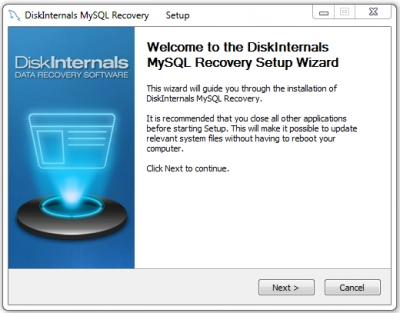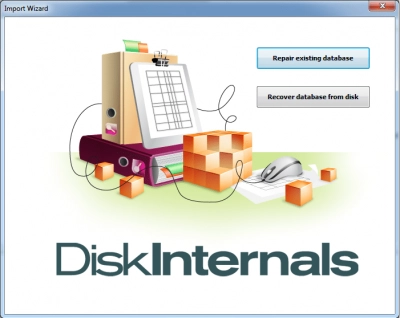What should you do to repair MySQL databases with no harm to your data?
Here you will find out:
- how to repair MySQL databases
- how DiskInternals can help you
Are you ready? Let's read!
1. MySQL Recovery
MySQL Recovery from DiskInternals will recover your databases from disk and existing MyISAM and InnoDB databases. The application exists in two versions:
- free trial (equipped with all functions except export, that is, an approximate version to check the quality of services);
- paid full-featured version without any restrictions, including export and technical support in the future.
You can view and evaluate all text documents and images found during scanning for free
DiskInternals MySQL Recovery supports NTFS, HFS, Ext2 / 3/4, ReiserFS, ReFS, UFS, FAT, RomFS (as a reader), XFS, Reiser4. Of course, the application has a built-in wizard with possible support for you in controversial and incomprehensible situations. More often, using the Wizard is easier to recover lost databases than trying to do it manually. However, if you have a difficult case, it is better to do database recovery without the help of the Wizard.
You will have more additional opportunities to do everything at the highest level.
So arm yourself with DiskInternals MySQL Recovery and get your databases back like a pro.
Read the instructions, and you will understand how easy this tool is to use:
Once you download DiskInternals MySQL Recovery, run it.
The recovery wizard, which will appear immediately, will offer you several options to choose from:
- restore an existing database
- recover a deleted database file from disk
Select one of them and follow the instructions of the recovery wizard.
The scanning will be fast, and the results will not be long in coming.

After scanning, you can preview the recovered database by clicking the preview table.
Then enter the license key in the corresponding window (for this, you need to buy a license).

You can now export and save the database using the Export Wizard.
The following are the standard methods for restoring and repairing databases. And DiskInternals MySQL Recovery handles the worst cases of table corruption and deletion, so always keep that in mind.
2. MySQlCHK
The tool MySQlCHK comes with MySQL, and the client can independently perform table maintenance, namely; check, fix, optimize, and analyze the table.
To repair damaged tables, use the command:
MySQlCHK --auto-repair -o --all-databases -uroot -p
This way, you can start checking the tables line-by-line.
If this method did not help you recover your databases (and it happens because the commands sometimes freeze), then using DiskInternals MySQL Recovery will save you, do not hesitate!
3. InnoDB
To restore an InnoDB table, you can try restarting it in restore mode. To accomplish this, stop the MySQL service and restart it after adding the following parameters to my.cnf:
innodb_force_recovery = 3
innodb_purge_threads = 0
Using the data will help you to restart the failed database server with these parameters to dump:
mysqldump --single-transaction - quick --skip-extended-insert \ --routines -myuser -pmysecret dbname> /path/to/dumps/dir/dbname.dump.
If this method does not help in recovering InnoDB tables, you can still use DiskInternals MySQL Recovery - it does a great job of recovering InnoDB tables as well.
Good luck to you!